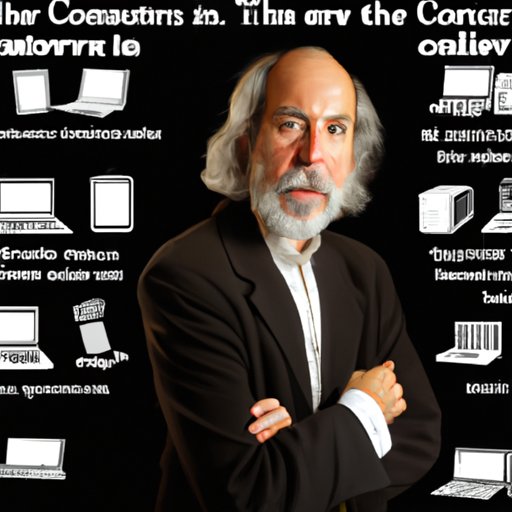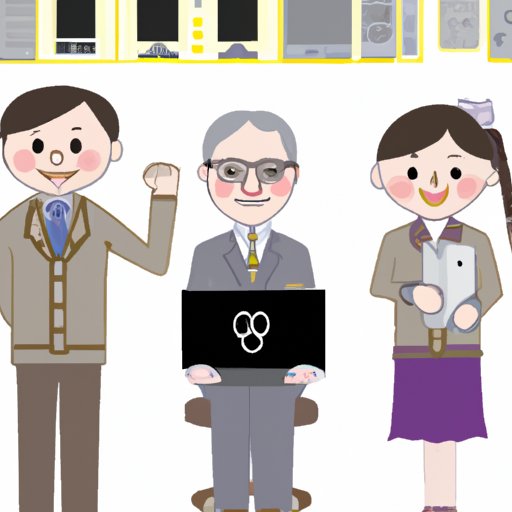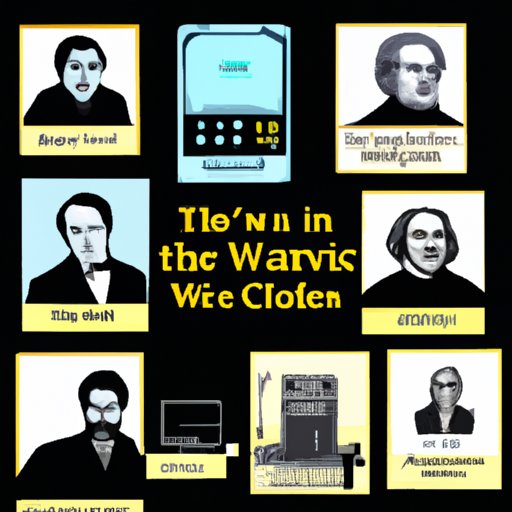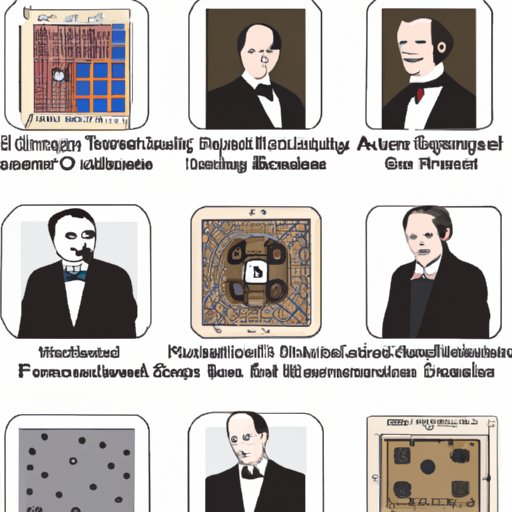Introduction
The invention of the computer has revolutionized the way we communicate, work, and live. Today, almost everything is done with the help of a computer. But who actually invented the computer? In this article, we will explore the pioneers behind the invention of the computer, from early computing machines to modern computers.
An In-Depth Look at Who Invented the Computer
The invention of the computer is credited to several innovators. Charles Babbage, Howard Aiken, Alan Turing, John von Neumann, and J. Presper Eckert and John Mauchly are some of the most prominent figures behind the invention of the computer.
Charles Babbage
Charles Babbage is often referred to as the “father of the computer” for his groundbreaking work in the field. In 1822, he designed a difference engine, which was a mechanical calculator capable of performing mathematical calculations. He then went on to design an analytical engine in 1834, which was a more advanced machine that could store and retrieve data. He is also credited with introducing the concept of programming to the world.
Howard Aiken
Howard Aiken was an American engineer and mathematician who developed the Harvard Mark I, one of the first programmable computers in 1944. The machine was based on the principles of Charles Babbage’s analytical engine and was used to perform complex calculations for the U.S. Navy during World War II. The success of the Harvard Mark I led to the development of other programmable computers.
Alan Turing
Alan Turing was a British mathematician and logician who is widely considered to be the father of modern computer science. He developed the Turing machine in 1936, which was a theoretical device that could solve any problem given to it. He also developed the Turing test, which is used to determine if a machine is capable of human-like intelligence. His work laid the foundations for modern computer science.
John von Neumann
John von Neumann was a Hungarian-American mathematician and physicist who made major contributions to the fields of mathematics, physics, economics, and computer science. He developed the Von Neumann architecture, which is the basis for modern computers. He also developed the stored-program concept, which allowed computers to store programs in memory and execute them.
J. Presper Eckert and John Mauchly
J. Presper Eckert and John Mauchly were two American engineers who developed the first general-purpose electronic computer, the ENIAC (Electronic Numerical Integrator and Computer). The machine was completed in 1945 and was used to calculate ballistic trajectories for the U.S. Army during World War II. The success of the ENIAC led to the development of other electronic computers.
A Comprehensive Timeline of the Invention of the Computer
The invention of the computer can be traced back to the late 1700s. Here is a timeline of the key milestones in the invention of the computer:
Early Computing Machines
The first calculating machines were developed in the late 1700s and early 1800s. These included the Pascaline, developed by Blaise Pascal in 1642, and Charles Babbage’s Difference Engine, developed in 1822. These machines were capable of performing basic arithmetic operations.
The First Programmable Computers
The first programmable computers were developed in the 1940s. These included the Colossus, developed by Alan Turing in 1943, and the Harvard Mark I, developed by Howard Aiken in 1944. These machines were capable of executing instructions stored in memory.
Personal Computers
The first personal computers were developed in the 1970s. These included the Apple I, developed by Steve Jobs and Steve Wozniak in 1976, and the Commodore PET, developed by Jack Tramiel in 1977. These machines were able to store and run programs on a single machine.
Exploring the Pioneers Behind the Invention of the Computer
In order to understand the invention of the computer, it is important to look at the pioneers behind the invention. Here is a brief overview of the innovators who made the computer possible:
Charles Babbage
Charles Babbage is widely regarded as the “father of the computer” for his groundbreaking work in the field. He developed the difference engine in 1822 and the analytical engine in 1834. His work laid the foundations for modern computer science.
Howard Aiken
Howard Aiken was an American engineer and mathematician who developed the Harvard Mark I, one of the first programmable computers in 1944. The machine was based on the principles of Charles Babbage’s analytical engine and was used to perform complex calculations for the U.S. Navy during World War II.
Alan Turing
Alan Turing was a British mathematician and logician who is widely considered to be the father of modern computer science. He developed the Turing machine in 1936, which was a theoretical device that could solve any problem given to it. He also developed the Turing test, which is used to determine if a machine is capable of human-like intelligence.
John von Neumann
John von Neumann was a Hungarian-American mathematician and physicist who made major contributions to the fields of mathematics, physics, economics, and computer science. He developed the Von Neumann architecture, which is the basis for modern computers. He also developed the stored-program concept, which allowed computers to store programs in memory and execute them.
J. Presper Eckert and John Mauchly
J. Presper Eckert and John Mauchly were two American engineers who developed the first general-purpose electronic computer, the ENIAC (Electronic Numerical Integrator and Computer). The machine was completed in 1945 and was used to calculate ballistic trajectories for the U.S. Army during World War II.

Examining the Evolution of Computers and Their Inventors
The invention of the computer has gone through several stages of evolution. Here is a brief overview of the evolution of computers and their inventors:
Early Computing Machines
The first calculating machines were developed in the late 1700s and early 1800s. These machines were capable of performing basic arithmetic operations. They were developed by innovators such as Blaise Pascal and Charles Babbage.
The First Programmable Computers
The first programmable computers were developed in the 1940s. These machines were capable of executing instructions stored in memory. They were developed by innovators such as Alan Turing and Howard Aiken.
Personal Computers
The first personal computers were developed in the 1970s. These machines were able to store and run programs on a single machine. They were developed by innovators such as Steve Jobs and Steve Wozniak.

The People Who Made the Computer Possible
The invention of the computer would not have been possible without the contributions of several innovators. Here is a brief overview of the people who made the computer possible:
Charles Babbage
Charles Babbage is widely regarded as the “father of the computer” for his groundbreaking work in the field. He developed the difference engine in 1822 and the analytical engine in 1834. His work laid the foundations for modern computer science.
Howard Aiken
Howard Aiken was an American engineer and mathematician who developed the Harvard Mark I, one of the first programmable computers in 1944. The machine was based on the principles of Charles Babbage’s analytical engine and was used to perform complex calculations for the U.S. Navy during World War II.
Alan Turing
Alan Turing was a British mathematician and logician who is widely considered to be the father of modern computer science. He developed the Turing machine in 1936, which was a theoretical device that could solve any problem given to it. He also developed the Turing test, which is used to determine if a machine is capable of human-like intelligence.
John von Neumann
John von Neumann was a Hungarian-American mathematician and physicist who made major contributions to the fields of mathematics, physics, economics, and computer science. He developed the Von Neumann architecture, which is the basis for modern computers. He also developed the stored-program concept, which allowed computers to store programs in memory and execute them.
J. Presper Eckert and John Mauchly
J. Presper Eckert and John Mauchly were two American engineers who developed the first general-purpose electronic computer, the ENIAC (Electronic Numerical Integrator and Computer). The machine was completed in 1945 and was used to calculate ballistic trajectories for the U.S. Army during World War II.

A History of the Innovators Who Created the Computer
The invention of the computer is a story of innovation and ingenuity. Here is a brief overview of the history of the innovators who created the computer:
Charles Babbage
Charles Babbage is widely regarded as the “father of the computer” for his groundbreaking work in the field. He developed the difference engine in 1822 and the analytical engine in 1834. His work laid the foundations for modern computer science.
Howard Aiken
Howard Aiken was an American engineer and mathematician who developed the Harvard Mark I, one of the first programmable computers in 1944. The machine was based on the principles of Charles Babbage’s analytical engine and was used to perform complex calculations for the U.S. Navy during World War II.
Alan Turing
Alan Turing was a British mathematician and logician who is widely considered to be the father of modern computer science. He developed the Turing machine in 1936, which was a theoretical device that could solve any problem given to it. He also developed the Turing test, which is used to determine if a machine is capable of human-like intelligence.
John von Neumann
John von Neumann was a Hungarian-American mathematician and physicist who made major contributions to the fields of mathematics, physics, economics, and computer science. He developed the Von Neumann architecture, which is the basis for modern computers. He also developed the stored-program concept, which allowed computers to store programs in memory and execute them.
J. Presper Eckert and John Mauchly
J. Presper Eckert and John Mauchly were two American engineers who developed the first general-purpose electronic computer, the ENIAC (Electronic Numerical Integrator and Computer). The machine was completed in 1945 and was used to calculate ballistic trajectories for the U.S. Army during World War II.
Conclusion
The invention of the computer has revolutionized the way we communicate, work, and live. From early computing machines to modern computers, the invention of the computer is a story of innovation and ingenuity. Several innovators have contributed to the invention of the computer, including Charles Babbage, Howard Aiken, Alan Turing, John von Neumann, and J. Presper Eckert and John Mauchly. Without their contributions, the computer would not exist today.
(Note: Is this article not meeting your expectations? Do you have knowledge or insights to share? Unlock new opportunities and expand your reach by joining our authors team. Click Registration to join us and share your expertise with our readers.)
